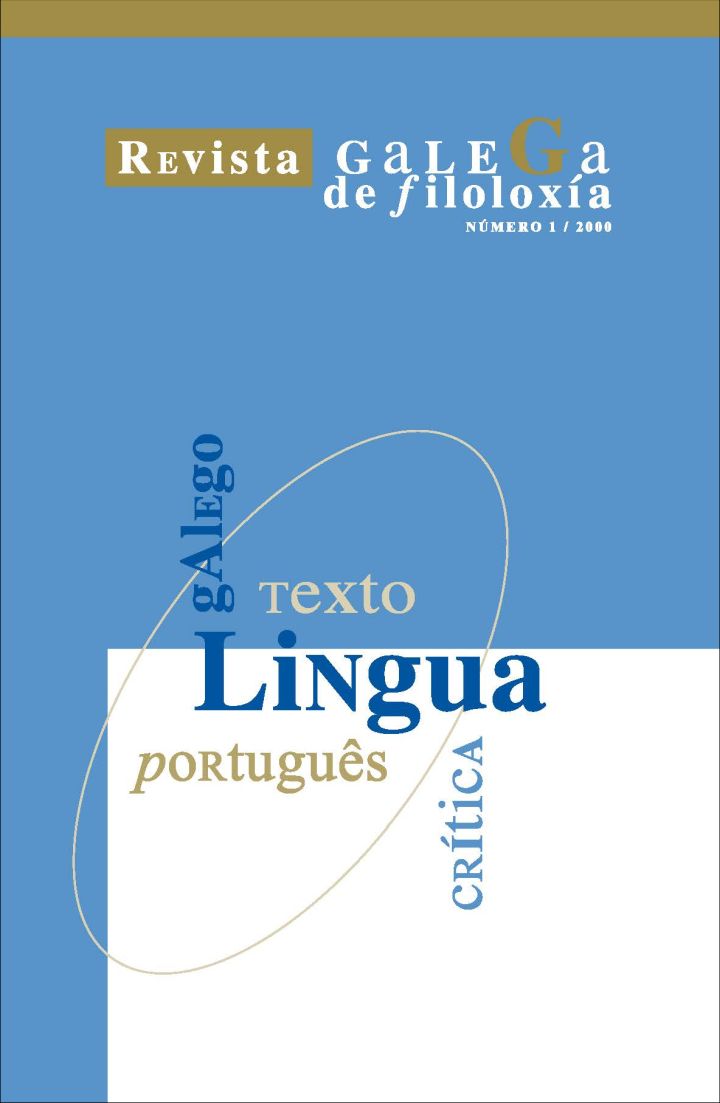Grammatical gender and linguistic sexism in Galician
Main Article Content
Abstract
Gender is a grammatical category that classifies nouns as masculine or feminine and triggers agreement in related words. At times, however, the inflectional gender morpheme expresses a semantic opposition. This study examines the different ways of expressing semantic information in relation to sex in Galician, and the relationship between lexical and grammatical gender. The second part of the analysis attempts to provide a definition for the concept of linguistic sexism, bearing in mind the non-biunivocal relationship between grammatical gender and sex. To conclude, the author reflects on the development and use of non-sexist language, noting that we must take into account not just of the linguistic forms themselves but of the meanings and connotations they acquire.
Keywords:
Downloads
Metrics
Article Details
References
Alpher, B. (1987), "Feminine as the unmarked grammatical gender: Buffalo girls are no fools", Australian Journal of Linguistics 7, 169-187.
Arias Barredo, A. (1995), De feminismo, machismo y género gramatical (El género, un monema no exclusivamente gramatical), Valladolid, Universidad de Valladolid.
Baron, D. (1986), Grammar and Gender, New Haven and London, Yale University Press.
Bodine, A. (1975), "Androcentrism in prescriptive grammar: singular 'they', sex-indefinite 'he' or 'she"', Language in Society 4, 129-146.
Bonfantini, M. A. (1987), "Sobre la connotación", Estudios de Lingüística 4, 149-158.
Callamard, A. (1998), "Le sexisme á fleur de mots", Le Monde Diplomatique, 15 marzo, 28.
Camara Jr., J. Mattoso (19744 ), Princípios de Lingüística Geral, Rio de Janeiro, Livraria Acadêmica.
Campos, M. H. C.I Xavier, M. F. (1991), Sintaxe e semântica do português, Lisboa, Universidade aberta.
Castro, R. de (1865), "Las Literatas. Carta a Eduarda", Almanaque de Galicia, Lugo, Soto Freire, 56-58.
Corbett, G. G. (1991), Gender, Cambridge, Cambridge University Press.
Coseriu, E. (1981 2 ), Principios de semántica estructural, Madrid, Gredos.
DAE (1994) = Dicionário Aurélio Eletrônico, Rio de Janeiro, Nova Fronteira.
DLP (1992) = Dicionário da Língua Portuguesa, Porto, Porto Editora.
DRAG (1998) = Diccionario da Real Academia Galega, A Coruña, RAG.
Ervin, S. M. (1962), "The Connotations of Gender", Word 18, 3, 249-261.
Espiño Amil, M. (1997), "Aos señores que fan diccionarios", Andaina 19, 35-36.
Ferreiro, M. (1997), Gramática histórica galega II. Lexicoloxía, Santiago de Compostela, Laiovento.
Fodor, I. (1959), "The origin of grammatical gender", Lingua 8, 1-41, 186-214.
Freixeiro Mato, X. R. (1999), Gramática da Lingua Galega III. Semántica, Vigo, A Nosa Terra.
García Cancela, X. / Díaz Abraira, C. L. (1991), Manual de linguaxe administrativa, Santiago de Compostela, Xunta de Galicia.
García Meseguer, A. (1994), ¿Es sexista la lengua española? Una investigación sobre el género gramatical, Madrid, Paidós.
Gonçalves, M. (1995), "Sobre a origem do género", Diacrítica 10, 117-130.
González Femández, I. (1978), Sufijos nominales en el gallego actual, Santiago de Compostela, Anexo 11 de Verba.
González Ollé, F. (1981), "La negación expresiva mediante la oposición sintagmática de género gramatical: El tipo sin dineros ni dineras y sus variantes", Logos semantikos IV. Gramática. Studia Lingüística in honorem E. Coseriu 1921-1981, Madrid, Gredos, 190-198.
Hasse1rot, B. (1950), "Du changement de genre comme moyen d'indiquer une relation de grandeur dans les langues romanes", Vox Romanica 11, 135-147.
Lapa, M. R. (198411 ), Estilística da Língua Portuguesa, Coimbra, Coimbra Editora.
Lyons, J. (1971), Introducción en la lingüística teórica, Barcelona, Teide.
Mey, J. L. (1985), Whose language? A study in linguistic pragmatics, Amsterdam, John Benjamins.
Nissen, U. K. (1986), "Sex and gender specification in Spanish", Journal ofPragmatics 10, 725-738.
Porto Dapena, J. A. (1977), El gallego hablado en la comarca ferrolana, Santiago de Compostela, Anexo 9 de Verba.
Rivas Cid, X. (1994), Curso práctico de linguaxe administrativa para funcionarios da Xunta de Galicia, Santiago de Compostela, Xunta de Galicia.
Spender, D. (1979), Man made language, London, Routledge and Kegan Paul.
Spitzer, M. (1941), "Feminización del neutro", Revista de Filología Hispánica 3, 339-371.
Surridge, M. E. (1993), "Gender assignment in french: The hierarchy of rules and the chronology of acquisition", IRAL, 77-95.
Thome, B. / Henley, N. (1978), "Difference and dominance: an overview of language, gender, and society", in Thome, B. / Henley, N. (eds.), Language and sexo Difference and dominance, Massachusetts, Newbury House Publishers, 5-42.
Ullmann, S. (19875 ), Semântica. Uma introdução à ciencia do significado, Lisboa, Fundação Calouste Gulbenkian.
Vila Pujol, M.-R. (1989), "Sobre el sustantivo masculino con rasgo de sexo", Anuario de estudios filológicos XII, 311-323.
Violi, P. (1991), El infinito singular, Madrid, Cátedra / Universitat de Valencia / Instituto de la Mujer.


